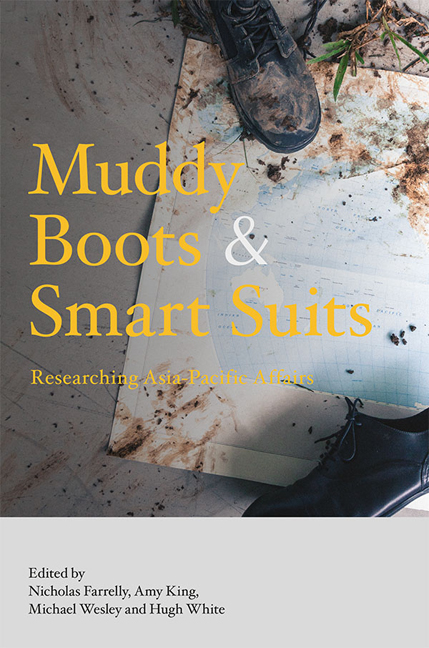Book contents
- Frontmatter
- Contents
- About the Contributors
- 1 Introduction to Research in Asia-Pacific Affairs
- Section I In the Field
- Section II Analysing Politics
- Section III Shaping a Region
- Section IV Conflict and Order
- Section V Policy and Practice
- 12 Securing the Local and the Global: The Story of Policy Engagement
- 13 Muddy Boots and Smart Suits: Practical Considerations for Research in the Twenty-first Century
- Bibliography
- Index
13 - Muddy Boots and Smart Suits: Practical Considerations for Research in the Twenty-first Century
from Section V - Policy and Practice
Published online by Cambridge University Press: 12 January 2018
- Frontmatter
- Contents
- About the Contributors
- 1 Introduction to Research in Asia-Pacific Affairs
- Section I In the Field
- Section II Analysing Politics
- Section III Shaping a Region
- Section IV Conflict and Order
- Section V Policy and Practice
- 12 Securing the Local and the Global: The Story of Policy Engagement
- 13 Muddy Boots and Smart Suits: Practical Considerations for Research in the Twenty-first Century
- Bibliography
- Index
Summary
NEW KNOWLEDGE
Creating new knowledge — the task at the heart of research practice — is almost never straightforward. Whether you are in a Hmong village in northern Thailand, a government office in Canberra, a dusty archive in Beijing, or a banquet hall in Singapore, there is no single, or simple, way that research in Asia-Pacific affairs should be done. For some researchers, their career is spent down in the dirt, where muddy boots may be symbolic of long commitments. Others spend their time among sharply-dressed officials and business people — the other end of the continuum. Lack of unanimity about preferred research tactics and techniques inspires us to consider the many different ways that researchers can successfully blend disciplinary, thematic, and geographical orientations to support their analysis about how the world works and why. In fact, it is this wide variety of research practice that helps to sharpen our understanding of politics at the local, national, regional, and global levels. Good research begins with a puzzle about how things happen. In this chapter, we reflect on the different practices of solving these research puzzles, and consider the conceptual, ethical, and practical challenges researchers face in their quest to understand some of the biggest questions in social, political, and economic life.
The practical challenges of research tend not to receive much everyday attention beyond methodology classes, which often narrowly emphasize mechanics rather than cultures.
This is partly the result of professional hesitation about revealing some of the many difficulties involved in effective and sustained research practice. Researchers often enjoy a life of flexibility in terms of research topic and approach, with a variety of intellectual entanglements that can be the envy of those in many other twenty-first century jobs. Researchers also face the perpetual struggle for positions, funding, and priority in academic political economies that can prove inhospitable, even for the best prepared. Entire subcultures of academic reflection are devoted to the gripes and grievances of those who imagine that a gilded age has recently vanished: much of this material is nowadays found online, a global common room.
- Type
- Chapter
- Information
- Muddy Boots and Smart SuitsResearching Asia-Pacific Affairs, pp. 185 - 198Publisher: ISEAS–Yusof Ishak InstitutePrint publication year: 2017

